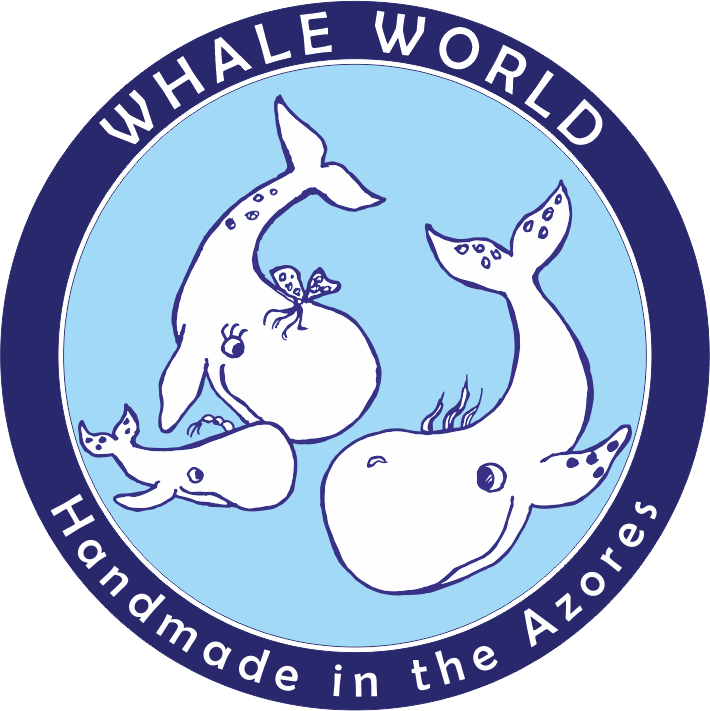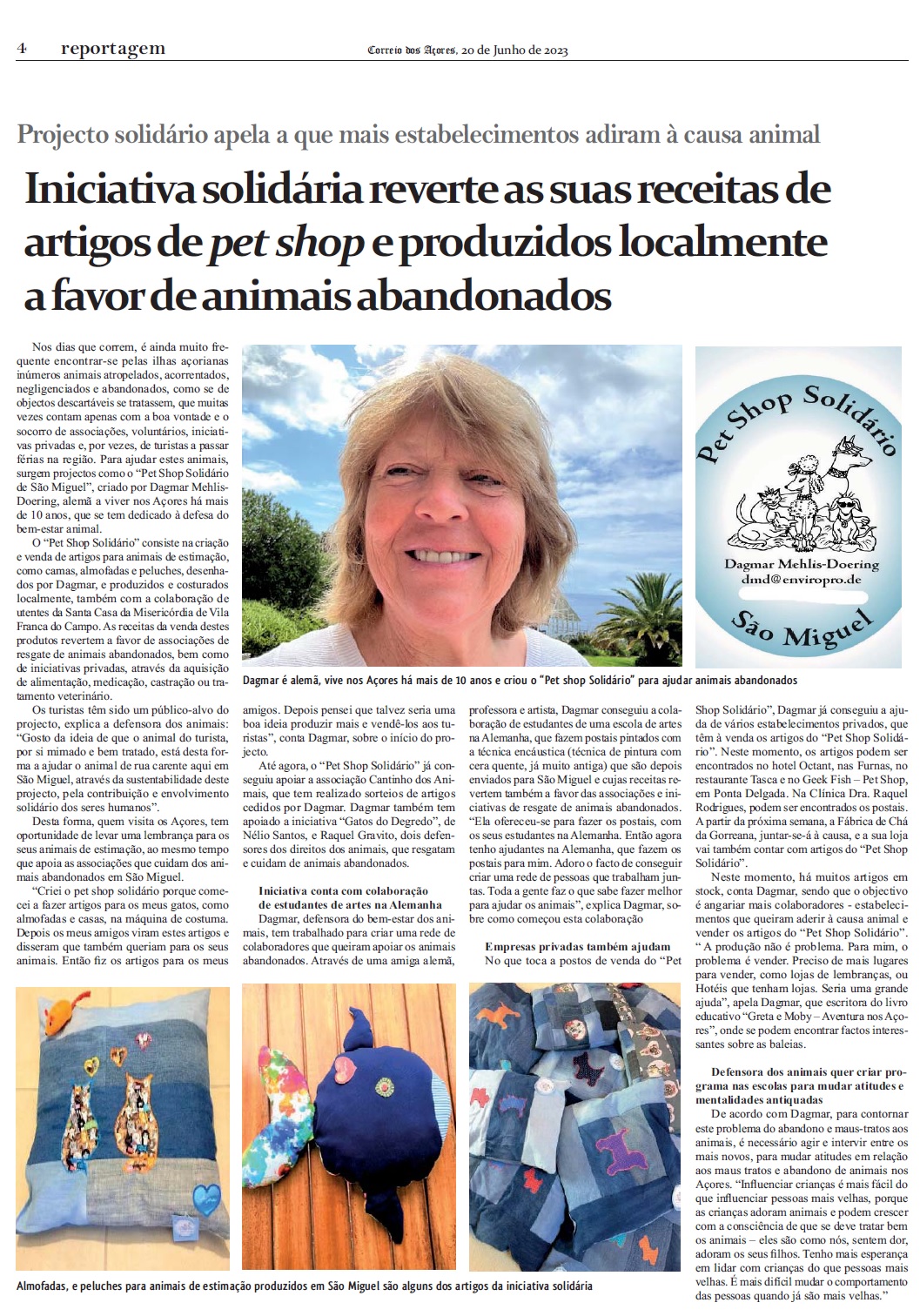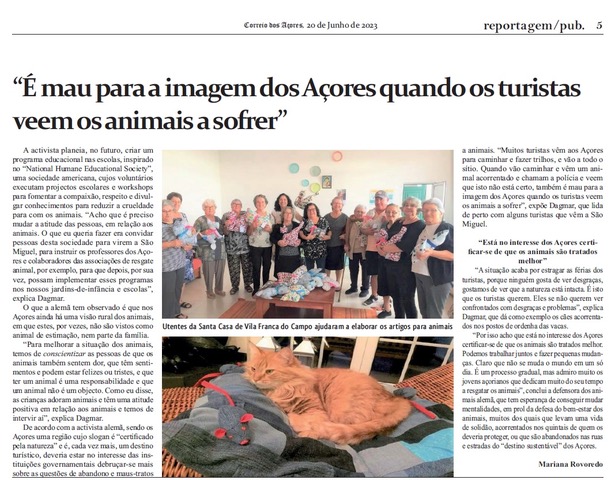Charitable project appeals for more establishments to join the animal cause
Solidarity initiative donates its revenues from locally produced pet shop items
to support abandoned animals
In current times, it is still very common to come across numerous run over, chained, neglected, and abandoned animals in the Azorean islands, as if they were disposable objects. Often, they rely solely on the goodwill and assistance of associations, volunteers, private initiatives, and sometimes tourists vacationing in the region. To help these animals, projects such as the “Pet Shop Solidário de São Miguel” (São Miguel Solidarity Pet Shop) emerge, created by Dagmar Mehlis-Doering, a German resident in the Azores for over 10 years who is dedicated to animal welfare.
The “Pet Shop Solidário” creates and sells items for pets, such as beds, cushions and plush toys, designed by Dagmar and locally produced with the help of the sewing circle of the “Santa Casa da Misericórdia” in Vila Franca do Campo”. The proceeds from the sale of these products go to associations that rescue abandoned animals, as well as private initiatives, enabling the acquisition of food, medication, spaying/neutering, or veterinary treatment.
Tourists have been a target audience for the project, as explained by the animal advocate: “I like the idea that the tourist’s pet, pampered and well-treated, is thus helping the needy stray animal here in São Miguel through this project, thanks to the contribution and solidarity involvement of human beings.” Therefore, visitors to the Azores have the opportunity to buy a souvenir for their pets while supporting associations that care for abandoned animals in São Miguel.
“I created the solidarity pet shop because I started sewing items for my cats, such as cushions and cat caves. Then my friends saw these items and said they also wanted them for their pets. So, I made the items for my friends. Then I thought it might be a good idea to produce more and sell them to tourists,” Dagmar explains about the project’s inception.
So far, the “Pet Shop Solidário” has already supported the association “Cantinho dos Animais”, which has held raffles of items donated by Dagmar. Dagmar has also supported the initiative “Gatos do Degredo” (Cats of Degredo), led by Nélio Santos and Raquel Gravito, two animal rights advocates who rescue and care for abandoned animals.
Initiative collaborates with art students in Germany
Dagmar, an animal welfare advocate, has worked to create a network of collaborators willing to support abandoned animals. Through a German friend who is a teacher and artist, Dagmar secured the collaboration of students from an art school in Germany who create painted postcards using the encaustic technique (a very old painting technique with hot wax), which are then sent to São Miguel, with their proceeds also benefiting associations and initiatives that rescue abandoned animals.
“She offered to make the art cards with her students in Germany. So now I have helpers in Germany who make the postcards for me. I love the fact that I can create a network of people working together. Everyone does what they do best to help animals,” explains Dagmar about how this collaboration began.
Private companies also lend a hand
Regarding the sales outlets for the “Pet Shop Solidário”, Dagmar has already received help from several private establishments that sell the items. Currently, the products can be found at the “Octant Hotel” in Furnas, “A Tasca Restaurant”, and “Geek Fish Pet Shop” in Ponta Delgada. Postcards can be found at Clínica Dra. Raquel Rodrigues. Starting next week, the tea factory “Gorreana” will also join the cause, with its souvenir shop featuring items from the “Pet Shop Solidário”.
At the moment, there is a significant amount of stock, Dagmar mentions, and the objective is to recruit more supporters – establishments willing to join the animal cause and sell the “Pet Shop Solidário” items. “Production is not a problem. For me, the problem is selling. I need more places to sell, such as souvenir shops or hotels with stores. It would be a great help,” Dagmar appeals. She is also the author of the educational children’s book “Greta e Moby – Aventuras nos Açores” (Greta and Moby – Adventures in the Azores), which contains interesting facts about whales.
Animal advocate aims to implement a program in schools to change attitudes and outdated mentalities
According to Dagmar, in order to address the issue of animal abandonment and mistreatment, it is necessary to take action and intervene among younger generations to change attitudes towards animal abuse and abandonment in the Azores. “Influencing children is easier than influencing older people because children love animals and can grow up with the awareness that animals should be treated well—they are like us, they feel pain, they love their offspring. I have more hope in dealing with children than with older people. It is more difficult to change the behavior of people when they are already older.”
It’s bad for the image of the Azores when tourists see animals suffering
The activist plans to create an educational program in schools in the future, inspired by the “National Humane Educational Society,” an American society whose volunteers carry out school projects and workshops to promote compassion, respect, and knowledge dissemination to reduce cruelty towards animals. “I think we need to change people’s attitude towards animals. What I would like to do is invite people from this society to come to São Miguel to train teachers in the Azores and collaborators of animal rescue associations, so that they can implement these programs in our kindergartens and schools,” explains Dagmar.
What the German has observed is that there is still a rural view of animals in the Azores, where they are sometimes not seen as pets or part of the family. “To improve the situation of animals, we need to make people aware that animals also feel pain, have emotions, and can be happy or sad, and that having an animal is a responsibility and that an animal is not an object. As I said, children love animals and have a positive attitude towards them, and we need to intervene there,” explains Dagmar.
According to the German activist, as the Azores is a region whose slogan is “certified by nature” and is increasingly becoming a tourist destination, it should be in the interest of government institutions to focus more on issues of abandonment and animal abuse. “Many tourists come to the Azores for hiking and trails and go everywhere. When they go hiking and see a chained animal and call the police and realize that this is not right, it is also bad for the image of the Azores when tourists see animals suffering,” Dagmar points out, as she deals closely with some tourists who come to São Miguel.
It is in the interest of the Azores to ensure that animals are treated better
“The situation ends up ruining tourists’ vacations because no one likes to see misfortunes; we like to see that nature is intact. That’s what tourists want. They don’t want to be confronted with disasters and problems,” explains Dagmar, giving the example of dogs chained in the milking posts of cows.
“So, I think it is in the interest of the Azores to ensure that animals are treated better. We can work together and make small changes. Of course, you don’t change the world in one day. It’s a gradual process, but I greatly admire the young Azoreans who dedicate a lot of their time to rescuing animals,” concludes the German animal advocate, who hopes to change mentalities in favor of animal welfare, many of which lead a life of loneliness, chained in the backyards of those who should protect them, or abandoned on the streets and roads of the “sustainable destination” of the Azores.
Mariana Rovoredo
https://correiodosacores.pt/NewsDetail/ArtMID/383/ArticleID/45900/Iniciativa-solid225ria-reverte-as-suas-receitas-de-artigos-de-pet-shop-e-produzidos-localmente-a-favor-de-animais-abandonados
Deutsch:
Solidaritätsprojekt ruft mehr Einrichtungen dazu auf, sich dem Tierschutz anzuschließen
Solidaritätsinitiative nutzt ihre Einnahmen aus lokal hergestellten Tierbedarfsartikeln
zur Unterstützung von ausgesetzten Tieren
In der heutigen Zeit ist es immer noch sehr verbreitet, zahlreiche überfahrene, angekettete, vernachlässigte und ausgesetzte Tiere auf den Azoren-Inseln anzutreffen, als wären sie Wegwerfobjekte. Oftmals sind sie allein auf das Wohlwollen und die Hilfe von Vereinen, Freiwilligen, privaten Initiativen und manchmal auch von Touristen angewiesen, die sich in der Region im Urlaub befinden. Um diesen Tieren zu helfen, entstehen Projekte wie der “Petshop solidário de Sao Miguel” (“Solidarischer Zoohandel von São Miguel”), initiiert von Dagmar Mehlis-Doering, einer seit über 10 Jahren auf den Azoren lebenden Deutschen, die sich dem Tierschutz verschrieben hat.
Der “Petshop solidario“ stellt Artikel für Haustiere wie Kissen und Plüschtiere her, die von Dagmar entworfen und vor Ort genäht werden. Unterstützt wird sie dabei durch den Nähkreis der “Santa Casa da Misericórdia” in Vila Franca do Campo. Die Erlöse aus dem Verkauf dieser Produkte kommen Vereinen zugute, die ausgesetzte Tiere retten, sowie privaten Initiativen, die damit Futter, Medikamente, Kastration oder tierärztliche Behandlung finanzieren.
Touristen sind eine Zielgruppe des Projekts, wie die Tierschützerin erläutert: “Mir gefällt die Vorstellung, dass das Haustier eines Touristen, das verwöhnt und gut behandelt wird, auf diese Weise dem bedürftigen Straßentier hier auf São Miguel hilft, dank der Unterstützung und der solidarischen Beteiligung von Menschen.” So haben Besucher der Azoren die Möglichkeit, ein Andenken für ihre Haustiere zu erwerben und gleichzeitig Vereine zu unterstützen, die sich um ausgesetzte Tiere in São Miguel kümmern.
“Ich habe den “Petshop solidário” gegründet, weil ich angefangen habe, Artikel für meine Katzen zu nähen, wie Kissen oder Katzenhöhlen. Dann haben meine Freunde diese Artikel gesehen und gesagt, dass sie auch welche für ihre Tiere haben möchten. Also habe ich die Artikel für meine Freunde gemacht. Dann dachte ich, es wäre vielleicht eine gute Idee, mehr zu produzieren und sie an Touristen zu verkaufen”, erzählt Dagmar über den Beginn des Projekts.
Bisher hat der “Petshop solidário“ bereits die Vereinigung “Cantinho dos Animais” unterstützt, die Dagmars Produkte verlost. Dagmar hat auch die Initiative “Gatos do Degredo” (Katzen von Degredo) von Nélio Santos und Raquel Gravito unterstützt, zwei Tierschützer, die ausgesetzte Tiere retten und betreuen.
Initiative arbeitet mit Kunststudenten in Deutschland zusammen
Dagmar, eine Tierschützerin, hat daran gearbeitet, ein Netzwerk von Mitarbeitern aufzubauen, die bereit sind, ausgesetzten Tieren zu helfen. Durch eine deutsche Freundin, Lehrerin und Künstlerin, gelang es Dagmar, die Zusammenarbeit mit Kunststudenten einer Kunstschule in Deutschland zu erreichen.Sie fertigen Kunstkarten in einer sehr alten Wachsmaltechnik (Enkaustik), die dann nach São Miguel geschickt werden und deren Erlös ebenfalls Vereinen und Initiativen zur Rettung von ausgesetzten Tieren zugutekommt.
“Sie hat sich bereit erklärt, mit ihren Studenten in Deutschland die Kunstkarten herzustellen. Jetzt habe ich Helfer in Deutschland, die sie für mich machen. Mir gefällt die Idee, ein Netzwerk von Menschen aufzubauen, die zusammenarbeiten. Jeder macht das, was er am besten kann, um den Tieren zu helfen”, erklärt Dagmar über den Beginn dieser Zusammenarbeit.
Auch private Unternehmen leisten Unterstützung
In Bezug auf Verkaufsstellen für den “Petshop solidário“ hat Dagmar bereits die Unterstützung mehrerer Privatunternehmen erhalten, die ihre Artikel zum Verkauf anbieten. Derzeit können die Produkte im ”Octant Hotel” in Furnas, im Restaurant “A Tasca” und im “Geek Fish Pet Shop” in Ponta Delgada erworben werden. Die Kunstkarten sind in der Klinik Dra. Raquel Rodrigues erhältlich. Ab nächster Woche wird sich auch die Teefabrik “Gorreana” der Sache anschließen und in ihrem Souvenirladen die “Petshop”-Artikel führen.
Derzeit gibt es viele Artikel auf Lager, berichtet Dagmar, und das Ziel ist es, weitere Mitwirkende zu gewinnen – Einrichtungen, die sich der Tierschutzsache anschließen und unsere Artikel verkaufen. “Die Produktion ist kein Problem. Für mich ist das Problem der Verkauf. Ich brauche mehr Verkaufsstellen, wie Souvenirgeschäfte oder Hotels mit Geschäften. Das wäre eine große Hilfe”, appelliert Dagmar. Sie ist auch Autorin des Kinderbuchs “Greta e Moby – Aventuras nos Açores” (Greta und Moby – Abenteuer auf den Azoren), in dem interessante Fakten über Wale zu finden sind.
Tierschützerin möchte ein Programm an Schulen etablieren, um Einstellungen und veraltete Mentalitäten zu ändern
Um das Problem von Tieraussetzung und Tiermisshandlung auf den Azoren anzugehen und die Haltung der Menschen zu verändern, ist es nach Dagmars Ansicht notwendig, sich auf die jüngere Generation zu konzentrieren. “Kinder zu beeinflussen ist einfacher als ältere Menschen zu beeinflussen, weil Kinder Tiere lieben und mit dem Bewusstsein aufwachsen können, dass Tiere gut behandelt werden sollten – sie sind wie wir, sie spüren Schmerz, sie lieben ihre Nachkommen. Ich habe mehr Hoffnung, was Kinder anbelangt als mit älteren Menschen. Es ist schwieriger, das Verhalten von Menschen zu ändern, wenn sie bereits älter sind.”
Es ist schädlich für das Image der Azoren, wenn Touristen Tiere leiden sehen
Die Aktivistin plant in Zukunft die Schaffung eines Bildungsprogramms an Schulen, inspiriert von der “National Humane Educational Society”, einer amerikanischen Organisation, deren Freiwillige Schulprojekte und Workshops durchführen, um Mitgefühl, Respekt und Wissen zur Verringerung von Tierquälerei zu fördern. “Ich denke, wir müssen die Einstellung der Menschen gegenüber Tieren ändern. Was ich gerne tun würde, ist Menschen von dieser Organisation nach São Miguel einzuladen, um Lehrer auf den Azoren und Mitarbeiter von Tierschutzorganisationen zu schulen, damit sie diese Programme in unseren Kindergärten und Schulen umsetzen können”, erklärt Dagmar.
Was die Deutsche beobachtet hat, ist, dass es auf den Azoren immer noch eine ländliche Sichtweise auf Tiere gibt, bei der sie manchmal nicht als Haustiere oder Teil der Familie betrachtet werden. “Um die Situation der Tiere zu verbessern, müssen wir die Menschen dafür sensibilisieren, dass auch Tiere Schmerz empfinden, Gefühle haben und glücklich oder traurig sein können, und dass die Haltung eines Tieres eine Verantwortung ist und dass ein Tier kein Gegenstand ist. Wie ich bereits sagte, lieben Kinder Tiere und haben eine positive Einstellung ihnen gegenüber, und dort müssen wir eingreifen”, erklärt Dagmar.
Laut der deutschen Aktivistin sollte es im Interesse der Regierungsinstitutionen liegen, sich stärker mit Fragen der Tieraussetzung und Tierquälerei zu befassen, da die Azoren eine Region sind, deren Slogan “zertifiziert von der Natur” lautet und zunehmend ein beliebtes Reiseziel wird. “Viele Touristen kommen wegen Wandern und Ausflügen auf die Azoren und erkunden die gesamte Insel. Wenn sie beim Wandern ein angekettetes Tier sehen und die Polizei rufen und feststellen, dass dies nicht in Ordnung ist, schadet es auch dem Image der Azoren, wenn Touristen Tiere leiden sehen”, erklärt Dagmar, da sie häufig mit Touristen zu tun hat, die nach São Miguel kommen.
Es liegt im Interesse der Azoren sicherzustellen, dass Tiere besser behandelt werden
“Die Situation beeinträchtigt letztendlich den Urlaub der Touristen, da niemand Unglück sehen möchte; wir möchten sehen, dass die Natur intakt ist. Das ist es, was Touristen wollen. Sie möchten nicht mit Katastrophen und Problemen konfrontiert werden”, erklärt Dagmar und gibt das Beispiel von angeketteten Hunden an den Melkständen von Kühen.
“Ich denke daher, es liegt im Interesse der Azoren sicherzustellen, dass Tiere besser behandelt werden. Wir können zusammenarbeiten und kleine Veränderungen bewirken. Natürlich ändert man die Welt nicht an einem Tag. Es ist ein schrittweiser Prozess, aber ich bewundere die jungen Azorianer sehr, die viel Zeit darauf verwenden, Tiere zu retten”, schließt die deutsche Tierschutzaktivistin, die hofft, Mentalitäten im Sinne des Tierschutzes zu verändern, da viele Tiere einsam in Hinterhöfen angekettet sind, wo sie eigentlich geschützt werden sollten, oder auf den Straßen des “nachhaltigen Reiseziels” der Azoren ausgesetzt werden.
Mariana Rovoredo
https://correiodosacores.pt/NewsDetail/ArtMID/383/ArticleID/45900/Iniciativa-solid225ria-reverte-as-suas-receitas-de-artigos-de-pet-shop-e-produzidos-localmente-a-favor-de-animais-abandonados


